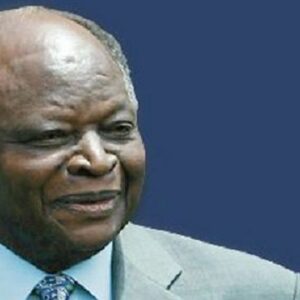Mwai Kibaki, Kenya’s third President, strove to bring about progressive transformation and stability in his country. From the early days of Kenya’s independence, he was involved in politics and held several government roles. He had previous expertise and knowledge of politics and government as Vice President, providing him an advantage in leading Kenya in the right democratic route. Since Kenya’s independence from Britain in 1963, the KANU (Kenyan African National Union) has ruled the country. After falling out with the then-autocratic president, Daniel Arap Moi, Mwai Kibaki created his own political party, the ‘Democratic Party,’ and began his own path to the presidency. He came into power at a pivotal juncture in Kenya’s history; he was a democratically elected leader who was hailed both nationally and internationally. While the enthusiasm did not last, as the country’s inherent political corruption continued to stifle and block development, Kibaki proposed constitutional change, free primary education, and measures to repair the country’s ailing healthcare system. To break free from autocratic authority, he built a multi-party system.
Childhood and Adolescence
Mwai Kibaki was the youngest of eight children born to peasant farmers Kibaki Githinji and Teresia Wanjiku on November 15, 1931. They lived in Gatuyaini, a community in Nyeri County, as members of the Kikuyu tribe, Kenya’s largest tribal group.
He was assigned to Man’gu High School, one of Kenya’s premier high schools, after demonstrating exceptional intelligence and aptitude for learning during his primary school years. Between 1947 and 1950, Kibaki was a student there.
He received a scholarship to Kenya’s prestigious Makerere University, where he studied economics, politics, and history. As chairman of the Kenya Students Association, a key post in the Makerere Students Guild, he demonstrated his leadership abilities, and he graduated with honors in 1955.
Mwai Kibaki obtained a scholarship to study at the London School of Economics after a brief spell as the Uganda Shell Company’s assistant general manager. He excelled in economics and public finance, and upon his return in 1958, he was ready to put his skills and knowledge to work for his homeland.
Mwai kibaki’s Career
Mwai Kibaki has accepted a post at Makerere University as an Assistant Lecturer in Economics. He left this position in 1960 to join the KANU (Kenyan African National Union), Kenya’s major political party at the time.
In the following years, sweeping reforms thrust him firmly into the political arena, culminating in Kenya’s independence from Britain three years later.
He was elected to the Kenyan Parliament in 1963 and served in several capacities until President Jomo Kenyatta appointed him Minister of Finance and Economic Planning in 1969.
Mwai Kibaki was appointed Vice-President under Daniel Arap Moi in 1978, when he succeeded to the presidency following Kenyatta’s death, after gaining vital experience and establishing a strong character and record during his early years in politics and government.
Kibaki was initially given the Finance position in Moi’s cabinet. As Finance Minister, he implemented policies and changes that helped Kenya achieve economic stability. He was given the portfolio of Home Affairs in 1982.
Moi’s administration became increasingly dictatorial, and he changed the constitution to make KANU the sole authorized political party. Moi removed Kibaki from the Vice Presidency and demoted him to the Ministry of Health in 1988 after assuming total control.
Kibaki resigned from KANU in 1991 due to conflicts and disagreements with the President. Civil unrest was on the rise at the time, and strong opposition to Moi’s oppressive policies compelled the removal of the constitutional statute that had established KANU’s one-party rule. Kibaki quit immediately to form the ‘Democratic Party.’
Moi’s hold on power, on the other hand, remained firm, even as the people revolted against his tyrannical and oppressive dictatorship. To stay in power for the next two elections, he used ethnically divisive and violent tactics.
Kibaki founded the National Rainbow Coalition with this turmoil in the background and various ethnic groups wanting representation (NARC).
After NARC gained traction and some MPs resigned from KANU, Kibaki was elected president in 2002, as Kenyans yearned for change and independence from Moi. His win was greeted with joy and strong expectations for Kenya’s future.
During his first tenure as president, he made significant economic changes, but the pervasive corruption that Kibaki promised to combat during his election campaign persisted.
Charges of manipulation and extensive fraud during the polls, as well as other scandals involving his coalition, had tainted his image by the time he won a second term in 2007.
He passed over the President to Uhuru Kenyatta after the 2013 presidential elections.
Kibaki’s Major Projects
Kibaki’s most significant contribution to Kenyan democracy was the 2010 constitutional reform. The new constitution establishes significant institutional checks and guarantees fundamental rights.
In 2003, he established free elementary education for all children in Kenya and rejuvenated the country’s ailing healthcare system. He fought for economic reforms in order to resurrect and enhance Kenya’s ailing economy. His policy initiatives enabled global corporations to invest in Kenya, allowing Kenyans to thrive and develop.
Because of his efforts to provide better healthcare to Kenyans, life expectancy and infant mortality numbers improved significantly between 2002 and 2012.
Personal History and Legacy
Mwai Kibaki married Lucy Mothoni in 1962 and has four children: Judy, a girl, and Jimmy, Tony, and David, three sons.
Kibaki was injured in a car accident during his presidential campaign in 2002, forcing him to use a wheelchair at his inauguration as president.
While he has disputed reports of a second marriage, doubts have been raised regarding his relationship with Mary Wambui, a Kenyan businesswoman with political ties with whom he is said to have a daughter, Wangui Mwai.
Estimated Net worth
Mwai Kibaki was a Kenyan politician with a $50 million dollar net worth at the time of his death. He is well recognized for serving as Kenya’s third President from 2002 to 2013.


